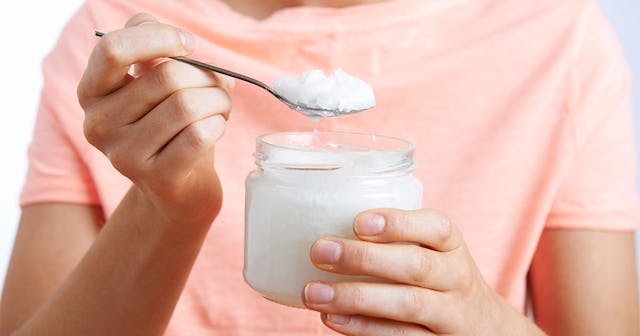Coconut Oil For Yeast Infections? Maybe, Maybe Not

Let’s talk about yeast infections: The itching, the burning, the smell, and then the antibiotics. It’s a wretched cycle to get from a yeast infection to having a healthy vagina.
Like what we put into our bodies, what we put in (and on) our vagina matters. Yeast infections, also known as vaginal candidiasis, affect over 70% of women at least once in their lifetime. I am in the 40-45% of women who report having a recurring yeast infection in my lifetime. They aren’t fun, and if gone untreated, can lead to a skin infection (and more medications, this time, stronger than those used to cure the yeast infection). In other words, treat the symptoms early. I was shocked when I learned that some women choose to use coconut oil on their vaginas to cure a yeast infection.
Now, don’t get me wrong, coconut oil is a Godsend. I am a Black woman married to a South Asian American woman. I get the importance of coconut oil. When we first met, my wife told me stories about how her Aunty would lather her hair with coconut oil, and she’d go to school smelling of coconut oil. When you visit a South Asian grocery store, you can find coconut oil in a little blue bottle made simply for the hair. You can find coconut oil-infused hair products everywhere. I mean the benefits for the hair are plenty: it can be used as a pre-poo, it promotes hair growth, it reduces frizz, and it can protect it from the sun and lice.
There are other benefits of coconut oil, like its moisturizing properties for skin. And coconut oil has also been known for its healing properties; in one study, it was found to reduce inflammation in the ears of rats. But would you — and should you — put it on your vagina?
Well, probably not.
While a 2007 study did find that coconut oil was effective in killing some types of yeast, the rest of the “evidence” is anecdotal at best. Does that mean it absolutely doesn’t work? Not necessarily, but in the absence of more concrete research about it, it’s best to rely on other remedies.
Many vagina owners are just trying the DIY route to save the cost of treatment. I get pinching pennies, but not at the risk of making whatever is happening between your legs worse.
If it’s medical treatment you’re concerned about, there are other natural remedies one can choose to help alleviate some of the symptoms associated with yeast infections. (Hint — the use of coconut oil is not one of them.) Here’s a list of five at-home remedies you can try.
- You can try boric acid capsules which have been approved by the CDC as a treatment option for vaginal candidiasis to be used for severe yeast infection cases.
- According to Medical News Today, the use of tea tree oil has worked for some. They say, “Vaginal suppositories containing tea tree oil have been shown to treat vaginal fungal infections. Some women report relief from adding diluted tea tree oil to a tampon and inserting this into the vagina overnight.” Who knew?!
- Eat some yogurt. It’s long been noted in medical journals that you can increase the amount of Lactobacillus acidophilus (helpful bacteria) in the body, which will then help to combat a yeast infection.
- Drink up! No, not rosé or shots of tequila, but lots of water. And then chase it down with cranberry. While neither of these should be done independently of other treatment methods (like suppositories), drinking them can help speed up how fast your vagina heals. I’ve tried both (water and cranberry juice), and it worked for me.
The medical jury is still out on whether coconut oil can be used to treat yeast infections. Some doctors believe it can be effective while others disagree. In an interview with Byrdie, two different doctors weigh in. Dr. Gersh, a gynecologist states, “In other words, it can kill various bacteria, viruses, parasites, and certain species of yeast.” While another, Dr. Gaither, recognizes, “There is no known confirmatory research indicating coconut oil as an effective methodology for treating vaginal yeast infections.” Two different female gynecologists, two different medical opinions.
What is not complicated about this conversation is this: consult your doctor as soon as something feels off, funky, or hella itchy. If you’re someone who prefers a more homeopathic approach, explain that to your doctor or go to a homeopath. But please, don’t get your medical advice from Reddit or TikTok.
The moral of the story: don’t let your vagina suffer because of advice you found on social media. For now, I’ll stick to using coconut oil for the hair on top of my head, not below the belt.
This article was originally published on